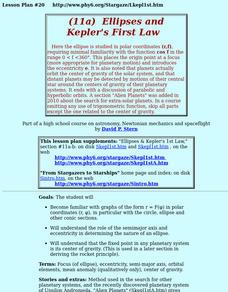Curated OER
Application of Ellipses
In this algebra worksheet, 11th graders apply ellipses to real life scenarios such as football, satellite and planet orbits. They discuss a variety of way sto apply ellipses.
Curated OER
Ellipses And Kepler's First Law
Learners explain that planets actually orbit the center of gravity of the solar system, and that distant planets may be detected by motions of their central star around the centers of gravity of their planetary systems.
University of Washington
Kepler’s Laws
Introduce your physics or astronomy class to Kepler's laws of planetary motion with this straightforward worksheet. It covers the basic concepts of each and has learners answer questions to demonstrate their grasp on them. You could use...
Curated OER
Exploring the Solar System
In this exploring the solar system worksheet, 6th graders use the online Gizmo then answer 14 questions and complete a chart about planets and orbits.
Curated OER
TE Activity: A Roundabout Way to Mars
Students investigate Hohmann orbit transfers using cardboard and string while focusing on the orbits of Earth and Mars. They look at the planets orbits around the sun and transfer orbit form one planet to another to determine what a...
Curated OER
Earth and Sun's Distance
Students consider the shape of the Earth's orbit around the Sun. They view the first segment of Science Court video and use Timeliner software to construct a scale of the distance between the Earth and the Sun.
Curated OER
How Does a Satellite Stay in Orbit?
Students explore placing a satellite into orbit, then about forces needed to keep an object in orbit. They examine how satellites orbit in elliptical paths and about properties of ellipses. They learn Kepler's 3rd Law of Planetary Motion
Curated OER
Kepler's Laws Review
In this Kepler's Laws worksheet, students answer questions about Kepler's three specific laws. They identify what the Elliptical Orbit Law, the Equal Area Law and the Harmonic Law mean.
New Mexico State University
Lab 6: Kepler's Laws
A 15-page package thoroughly teaches your physics or astronomy learners about Kepler's three laws of planetary motion. Each one is stated and explained. Class members answer questions, solve problems, and participate in the classic...
Physics Classroom
Kelper's Three Laws
A flipped classroom lesson introduces astrophysics fanatics to Kepler's three laws of planetary motion. After reading about the laws of ellipses, equal areas, and harmonies, and also learning how Newton's gravitation concepts come into...
Curated OER
Earth and Seasons
Sixth graders comprehend that the path Earth takes as it revolves around the sun is called its orbit. They also comprehend that the axis is an imaginary line that passes through Earth's center and its North and South Poles. Students...
Curated OER
Observing Mars in the Night Sky
Students compare and contrast the orbits of Earth and Mars, locate the planet Mars, and diagram its retrograde motion.
Curated OER
Was Kepler Correct?
Students are introduced to Kepler's 2nd law of Planetary Motion. The instructional activity reinforces the understanding of focal points. They calculate the sector area of an ellipse.Students expand understanding by modeling Kepler's 2nd...
Curated OER
Modeling Martian Motion
Students explore the difference between stars and planets and take on the role of these objects to simulate the relative motions of Mars and the Earth around the Sun.
Curated OER
Planet Earth
For this Earth worksheet, students review the characteristics of the Earth including it's rotation and revolution. This worksheet has 9 fill in the blank and 7 short answer questions.
Curated OER
Changing Perspectives on the Sun's Diameter
In this sun's diameter activity, learners use a photograph taken by the SOHO satellite of the sun showing a change in diameter from one month to another. Students find the average diameter of the sun, they determine the percent change in...
Curated OER
The Orbit Of Planet Gamma
Students investigate the concept of common errors that are made in the laboratory setting while analyzing the data of an experiment. They are given a scenario and are asked to measure the data of the major and minor axis. The purpose is...
Curated OER
Kepler and his Laws
Students examine Kepler's Laws. They confirm Kepler's 3rd law by comparing orbital periods and mean distances for all major planets and study conic sections, qualitatively.
Curated OER
The Analemma
Students describe the relationship between the tilt of Earth's axis and its yearly orbit around the sun, by learning about analemmas. They determine what they can do to show that the sun's position doesn't change, and they find ways to...
Curated OER
Introduction to Conics
Just exactly where does the name conic come from? This brief hands-on exploration explains it all. Have your class cut cones to create their own conics, then assess their understanding with a few identification problems. Consider making...
Smithsonian Institution
Geometric Shapes Collage
Junior geometers practice stating the names of different geometric shapes. They define and name the different shapes and compare and contrast shapes to one another. They also relate the shapes to objects in the real world.
Curated OER
Solar Systems Models Foldable Question Sheet
For this solar system worksheet, students use foldable models they made of the planets to answer questions about each planet. They answer questions about the theories and predictions made in our history about the solar system and answer...
Curated OER
Conic Sections Applications and Properties
In this algebra worksheet, 11th graders graph parabolas and figure out the major axis and minor axis of the graph. They also find the focus. There are 4 problems on this worksheet.
Curated OER
Formation of The Solar System
In this science worksheet, learners use basic scientific concepts to complete the series of puzzles that are intended to increase science literacy about the parts and formation of the solar system.

























